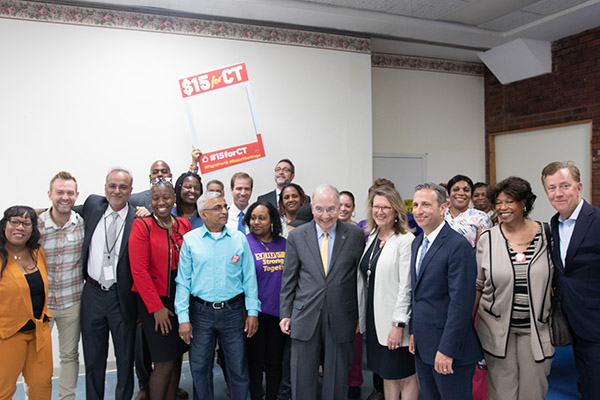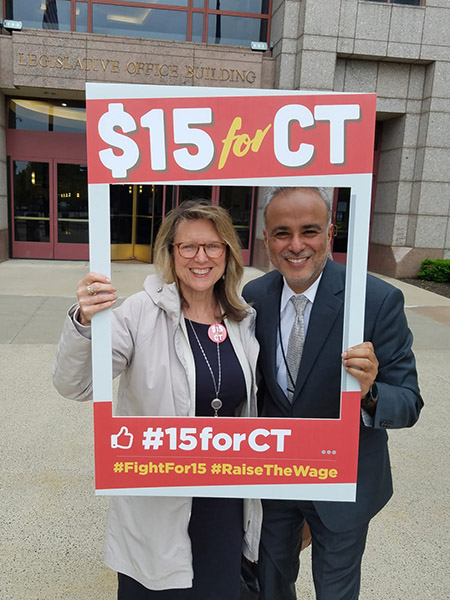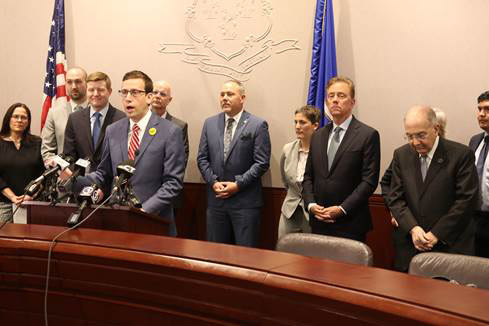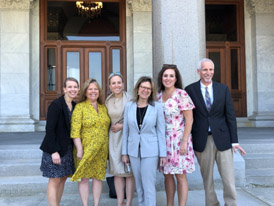Senator Kushner Takes A Stand To Improve Firearms Safety In Connecticut
HARTFORD – Today, State Senator Julie Kushner (D-Danbury) voted to approve three new bills designed to enhance firearms safety in Connecticut: requiring guns to be stored in locked containers in homes with minors; prohibiting the manufacturing of firearms without serial numbers (so-called “ghost guns”); and requiring firearms in unattended motor vehicles to be secure.
“I support everything that we has legislators can do to prevent gun violence and to make our schools, cities and residents safer. That’s our responsibility as lawmakers,” Sen. Kushner said. “In the household I grew up in, we did not have firearms. A lot of the talk actually revolved around the problem of gun violence in America. I eventually moved to Connecticut. My Senate district, and my hometown of Danbury, is very close to Newtown. The shooting at Sandy Hook had a huge impact on me, on my family, and on the residents of my district. Each of my children had a personal connection with someone who was killed at Sandy Hook. I have always been an advocate for firearms safety, but Sandy Hook made me redoubled my efforts, and the three bills we passed today are going to keep Connecticut residents safer from the random and intolerable firearms violence that is sweeping our country. Our children and our communities will be safer because of these new laws.”
The three bills passed in the Senate today included:
Ethan’s
Law
Current
state law requires gun owners to secure loaded guns in locked containers if a minor under the age of 16 lives in their home. House Bill No. 7218, commonly referred to as “Ethan’s Law,” strengthens that law by requiring safe storage for all guns – loaded and
unloaded – and additionally increases the age restriction from 16 years old to 18 years old. The legislation further makes negligent storage of a firearm a Class D felony and requires the Connecticut Board of Education to develop a K-12 guide on gun safety.
This
bill is named for Ethan Song, a 15-year-old from Guilford who died in 2018 when he was shot with an improperly stored gun at a friend’s house. The gun’s owner could not be prosecuted in relation to Song’s death because the gun was not loaded when it was improperly
stored.
According
to the Centers for Disease Control, in 2017, at least 2,696 children and adolescents were unintentionally shot after a gun was improperly stored; more than 100 were killed. Another 1,100 children took their own lives, many with unsecured firearms. The Harvard
School of Public Health found that adolescents who die by suicide are twice as likely to have access to a gun at home than those who survive suicide attempts.1
Ghost
Guns
The
rise of 3D printing and new technological possibilities has also led to the rise of untraceable handguns. With current kits available online, anyone, including those legally unable to possess guns, can make their own firearm with no serial number in about
three hours out of a combination of plastic parts and metal parts. These guns have been seized in Connecticut towns including Torrington, Ridgefield and Waterbury and were used in California mass shootings in 2013 and 2017. In both California shootings, two
individuals who could not legally own firearms each killed five people with “ghost guns” utilizing custom-made parts.2
House
Bill No. 7219 prohibits manufacturing a firearm without a serial number, manufacturing a plastic gun that can pass through security measures if its grips, stocks and magazines are taken off, and possessing, receiving or transferring an unfinished firearm frame
or lower receiver lacking a serial number. The Department of Emergency Services and Public Protection would need to issue serial numbers for those parts.
The
law provides exemptions for firearms produced by federally licensed manufacturers, antique firearms and firearms made before October 1, 2019 provided they are lawfully possessed. First-time offenses are class C felonies, but courts can suspend prosecution
for first-time offenders if the violations are not serious and an offender is not likely to violate the law further. California and New Jersey previously passed similar legislation; New York and Washington state put “ghost gun” bans into place earlier this
month. New Jersey’s law has seen success; at least 15 “ghost gun” companies ended sales in that state since it was enacted.3
Safe
Storage in Cars
House
Bill No. 7223 concerns safe storage of firearms in cars and would prohibit storing a pistol in an unattended motor vehicle, unless that pistol is in the trunk, a locked glove box or a locked safe. It would make first-time offenses class A misdemeanors with
further offenses being class D felonies. Law enforcement and certain security personnel receive exemptions, and the court can suspend prosecution for first-time offenders found unlikely to violate the law again.
This
law comes as many cities in the United States see rising numbers of gun thefts from cars, seeing year-to-year increases of up to 40 percent; Atlanta sees up to 70 percent of all reported gun thefts being guns stolen from cars.4
This
legislation can reduce the up to 600,000 guns stolen each year and reduce the number of illegal guns on streets, also preventing tragedies. In Florida, a pistol stolen from an unlocked vehicle in 2014 was used to kill a police officer later that year; in Tennessee,
a handgun stolen from a car in 1994 was traced to the murder of a teenage girl in Nashville in 2015.
Just
this week, a Hartford man was indicted for stealing firearms from vehicles in Newington and Ellington, then selling those guns to other individuals.5
Sources
1. https://www.hsph.harvard.edu/means-matter/means-matter/risk/
2. https://www.thetrace.org/2019/05/ghost-gun-california-crime/
3. https://www.reuters.com/article/us-new-jersey-ghost-guns-lawsuit/new-jersey-sues-company-over-illegal-ghost-gun-sales-idUSKCN1R32DA
4. https://patch.com/connecticut/ellington-somers/charges-filed-stolen-firearms-case-involving-ellington-cars
5. https://www.thetrace.org/2016/09/stolen-guns-cars-trucks-us-atlanta/



